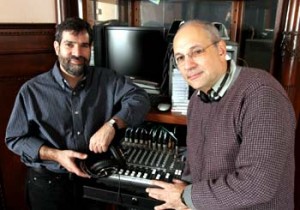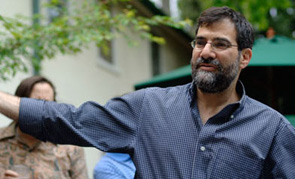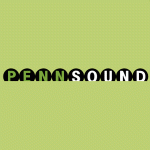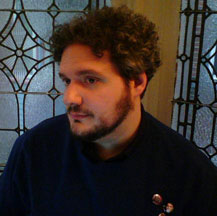Publishing Talks Interview with John Cheary of John Marshall Media
July 18, 2025 by David
Filed under PublishingTalks, Technology
 Publishing Talks began as a series of conversations with book industry professionals and others involved in media and technology, mostly talking about the future of publishing, books, and culture. It was great fun talking with people in the book industry about the evolution of publishing in the context of technology, culture, and economics.
Publishing Talks began as a series of conversations with book industry professionals and others involved in media and technology, mostly talking about the future of publishing, books, and culture. It was great fun talking with people in the book industry about the evolution of publishing in the context of technology, culture, and economics.
During the past several years, I’ve talked with a variety of innovators and leaders in independent publishing and bookselling from the past into the present.
These conversations have been inspirational to me. I have had the pleasure of speaking with visionaries and entrepreneurs, editors, publishers, and others who have influenced and changed contemporary literature and culture. And I’ve also had the opportunity to speak with longstanding friends and colleagues in the book business.
Whether you’re involved in book publishing or just interested in how the business works, it’s well worth understanding the ins and outs of audiobooks. Some of us can remember when audiobooks existed only on cassette tapes, which required a lot of effort and doubtless kept audiobook listening to a niche audience. With the advent of higher capacity CD’s, and more easily portable listening devices (and cars with factory CD players more frequently available), audiobook sales increased, but their higher cost kept audiobook sales from becoming a significant channel for most books (and the high cost of production prevented many titles from even being made into audiobooks).
In the past decade, the advent of digital audio players and near-universal broadband has changed the audiobook market completely. Audible was and remains the leader in digital audiobook sales, but there are many other outlets for audiobooks, and the market has expanded to become a significant revenue stream for publishers and authors.
John Cheary is the founder and CEO of John Marshall Media. He graduated from Berklee College of Music. Founding his business in 1995, he has grown it to become a leading independent audio production company – perhaps the largest of its kind. He knows more than almost anyone else I can think of about audiobook production and how the audio segment of the book business has evolved.
JMM produces audiobooks for a wide range of publishers, including Penguin Random House, Harper Audio, Google, Amazon, Scholastic, Macmillan, Simon & Schuster, McGraw-Hill, and many more. JMM has twenty one Studios in two countries, over 1,000 Narrators and Voice Actors, and has won five GRAMMY Awards.
It should come as no surprise that the biggest issue in audiobook publishing today is the advent of AI, seen by many as a way to replace more expensive humans with AI-generated narrators. Naturally, John has strong opinions about this subject—and many others. I think you will agree that what he has to say about AI narrators is likely applicable to other areas of creative business where AI use is being promoted as well.
John has been a friend and sometimes colleague for many years, and I am grateful to him for allowing me to record Writerscast interviews from time to time at JMM’s studio with its outstanding equipment and recording team—including this one.
I’d be surprised if you don’t learn something from this discussion — I certainly did. Please let me know what you think of our conversation.
Here’s a link to the JMM website.
Podcast: Play in new window | Download
Publishing Talks: David Wilk interviews Charles Bernstein and Al Filreis of PennSound
December 4, 2013 by David
Filed under Publishing History, PublishingTalks, Technology
 In this series of interviews, called Publishing Talks, I have been talking to book industry professionals and other smart people about the future of publishing, books, and culture. This is a period of disruption and change for all media businesses. We must wonder now, how will publishing evolve as our culture is affected by technology, climate change, population density, and the ebb and flow of civilization and economics?
In this series of interviews, called Publishing Talks, I have been talking to book industry professionals and other smart people about the future of publishing, books, and culture. This is a period of disruption and change for all media businesses. We must wonder now, how will publishing evolve as our culture is affected by technology, climate change, population density, and the ebb and flow of civilization and economics?
It’s my hope that these conversations can help us understand the outlines of what is happening in publishing and writing, and how we might ourselves interact with and influence the future of publishing as it unfolds.
PennSound is a very special online resource that was instigated by founders Al Filreis and Charles Bernstein with the incredible support of the University of Pennsylvania in Philadelphia. There is really nothing like it in the world, and for anyone interested in poetry, poetics, or the literary world of the past 100 years, it is an incredibly important resource. The energy and dedication that has gone into this unmatched collection of recordings of poets reading, lecturing and talking about poetry is a gift whose impact will be felt for many years to come.
Filreis wears many hats – he is Kelly Professor at UPenn, Director, Center for Programs in Contemporary Writing, Co-Director, PennSound, Publisher of the literary magazine Jacket2 as well as Faculty Director, Kelly Writers House. In addition, he is the author of a number of books of criticism. Charles Bernstein, an old friend of mine, is one of the most important poets and critical thinkers of his generation of writers. He was the David Gray Professor of Poetry and Letters at the SUNY Buffalo and Director of the Poetics Program, which he co-founded with poet Robert Creeley. At SUNY, he co-founded the Electronic Poetry Center with Loss Glazier. Charles is currently the Donald T. Regan Professor of English and Comparative Literature at the University Pennsylvania. He was a co-founder also of the important literary magazine L-A-N-G-U-A-G-E and is the author of many books of poetry and theoretical writings about poetry, language and thinking. Also in this discussion is Michael Hennessey, the editor of PennSound, and author of the “PennSound Daily” column. Michael holds an MFA in Creative Writing from Emerson College and has published critical work in magazines and anthologies.
I wanted to talk to Filreis, Bernstein and Hennessey about how PennSound came into being, to learn more about its scope and breadth, and to hear first hand their plans for the future. My hope is that our discussion will draw as much attention and support to PennSound as possible. And I can’t help enjoying the appropriateness of presenting an audio experience of this essential audio resource. There is something new and compelling posted at PennSound almost every day. Please visit, spend some time, and enjoy the rich trove of poetry as spoken and discussed by the poets themselves. Even those who don’t read or even like poetry have their minds changed by the experience of hearing the words out loud.
Even those who don’t read or even like poetry have their minds changed by the experience of hearing the words out loud.
Podcast: Play in new window | Download
Sites We Like: PennSound
PennSound is an incredible project established by Al Filreis and Charles Bernstein with tremendous support from the University of Pennsylvania, collecting poetry in audio form from an incredible array of sources. There really isn’t anything like it anywhere. There are historical recordings, so many of which are fantastic and powerful, that it is almost impossible to know where to start. All the poets whose work matters to me are here. And there are many voices from the recent past and the present as well. You can spend hours on this site and of course you will never be able to experience the full range of what they have, there is just too much. And there is new work added or highlighted every day! Amazing. For anyone interested in the sound of writing, this is a site you must visit.
Al Filreis and Charles Bernstein at PennSound (photo by Mark Stehle)
PennSound Daily is written by Michael S. Hennessey.
Want to read more?
- Control the number of PennSound Daily entries you’re viewing with the drop-down box at the top of the page, or
- visit the PennSound Daily archive.
You can subscribe to ![]() PennSound Daily with your favorite RSS feed reader. Or, use this link
PennSound Daily with your favorite RSS feed reader. Or, use this link ![]() to add PennSound Daily to your Google Reader or iGoogle homepage.
to add PennSound Daily to your Google Reader or iGoogle homepage.




